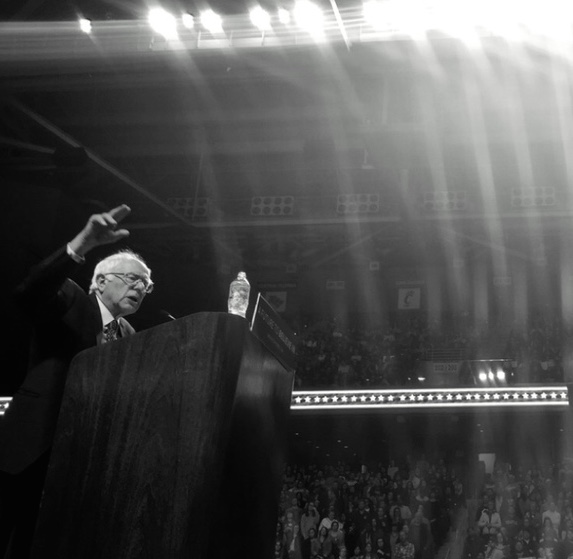
Like the thousands of others at Temple University’s Liacouras Center, April 6, I was eagerly anticipating seeing Bernie Sanders. As this was my first rally, I wasn’t quite sure what to expect. Fortunately, it was an even better experience than I anticipated. Unlike the thousands lined up around the block, I caught a break and got to cut to the front of the line with some of my friends. Immediately, I saw how caring and selfless this group of people were. Thanks to the cut, we ended up with floor access. Fifteen feet away from Bernie Sanders.
While we stood and waited for the rest of the crowd to be ushered in, many people began introducing themselves, talking about what they did and where they came from. There was no discussion of politics—just small conversation. Around 8 p.m., the first speaker came out. A girl in front of me who I had yet to introduce myself to let me in front of her as soon as she realized how short I was compared to everyone around me. Not only did I get closer, but no one complained.
At around 9, the man of the hour arrived. Energy levels were high. People booed, but they didn’t boo other people or candidates, they booed actions. People cheered, but not just for themselves, but for others around them. African Americans cheered for Immigration Reform and Hispanics cheered for the #BlackLivesMatter movement. When the topic switched to women’s rights, it was not the women that screamed the loudest, it was men who supported them. When free college tuition came up, older graduates cheered right along with all the students. In the end, I realized that there’s a stark difference between those who support Bernie and those who don’t.
Selflessness.
More often than not, you hear those who oppose him say, “They’re not entitled to my money. If they want more money, they should work hard and get it themselves.”
Here’s the thing though: poor people need help. If you’re not helping them, but complaining about how the government helps them with your money, you are not a nice person. They’re not entitled to “your” money? You’re not entitled to their care, services, or anything else you gain from them. And you do gain something from them. That’s what privilege is.
Privilege is not having to experience these problems, and therefore thinking that hard work and “fairness” will fix everyone’s issues. It’s really easy to be against abortion when all your condoms have stayed intact. It’s also really easy to be against free healthcare when you got lucky by having great genes (something that no amount of hard work can change. It’s easy to be against the #BlackLivesMatter movement when you can hide behind the privilege of having the benefit of the doubt because you’re lighter skinned. It’s really easy being against anything that privilege shields you from.
But while we’re on the topic, you’re not entitled to anything. At all. Even if you think you work harder than the rest, you are nothing but temporary on this earth. You’re basically insignificant compared to the billions that lived before you and the trillions to come. Your ancestors (to an extent) left you the earth to use. If you don’t think it’s important to do the same, congratulations. You can now add “selfish” to the list of adjectives that describe you.
Awards are given out for “best humanitarian,” and it floors me. You shouldn’t be applauded for being nice. You shouldn’t be awarded for the way you already should be. But that’s what it’s come to. Selflessness and kindness are such foreign concepts that we feel the need to applaud and bring to attention each time it happens, but being nice is just the human thing to do. Just be nice. Don’t expect anything for it.
Plant a tree. Nurse a bird with a broken wing. Buy someone a meal. Tip your 75 cents of change. Take the time to talk to a homeless person. Crack a joke instead of yelling at a fast food worker that messes up your order. Donate clothes instead of throwing them out. Donate blood. Serve food at a kitchen. Be there for someone you might not know that well. For goodness’ sake, hug someone if that’s all you can or want to do. Or even just a smile and wave.
Don’t do any of these things because you have to or because they’re required. Don’t think about whether the person gaining from this “deserves” it or not. Do it because you can. No one deserves poverty and no one deserves privilege. Simply do it because you are human and you understand that so are they.
Can’t understand how Bernie Sanders proposes a lot of his policies? It’s because he and everyone that supports him have the ability to think of others even when they’ve got nothing to gain.


